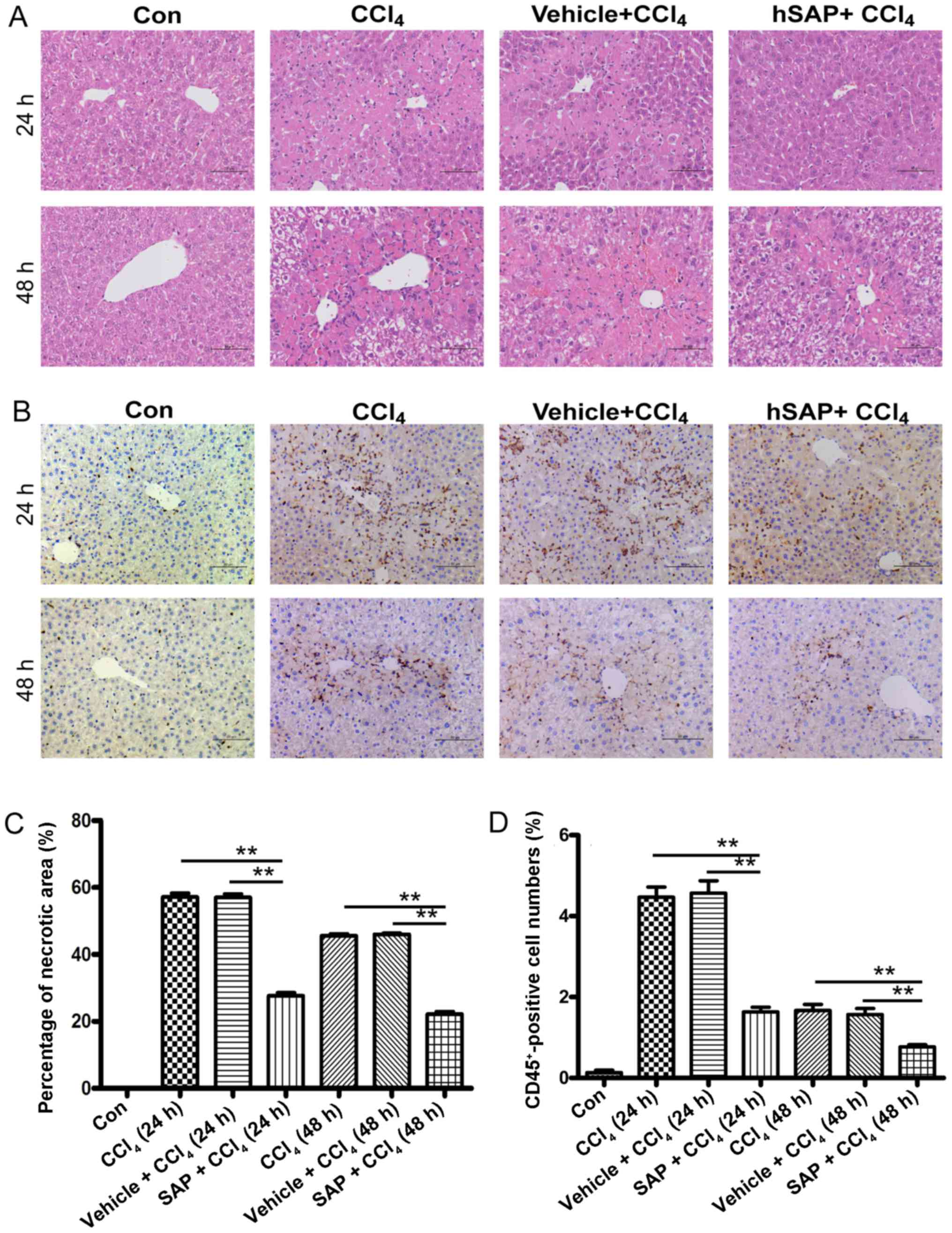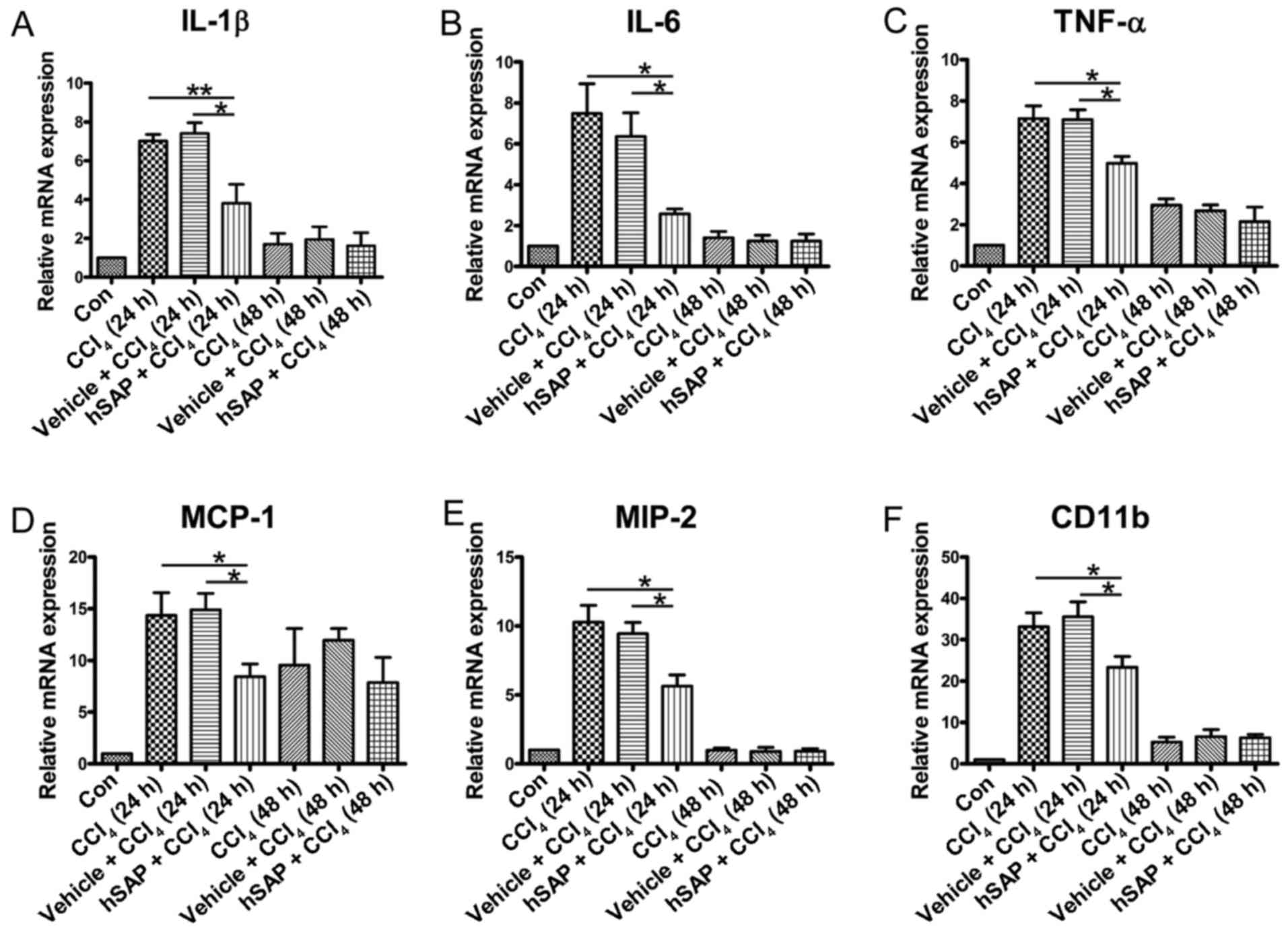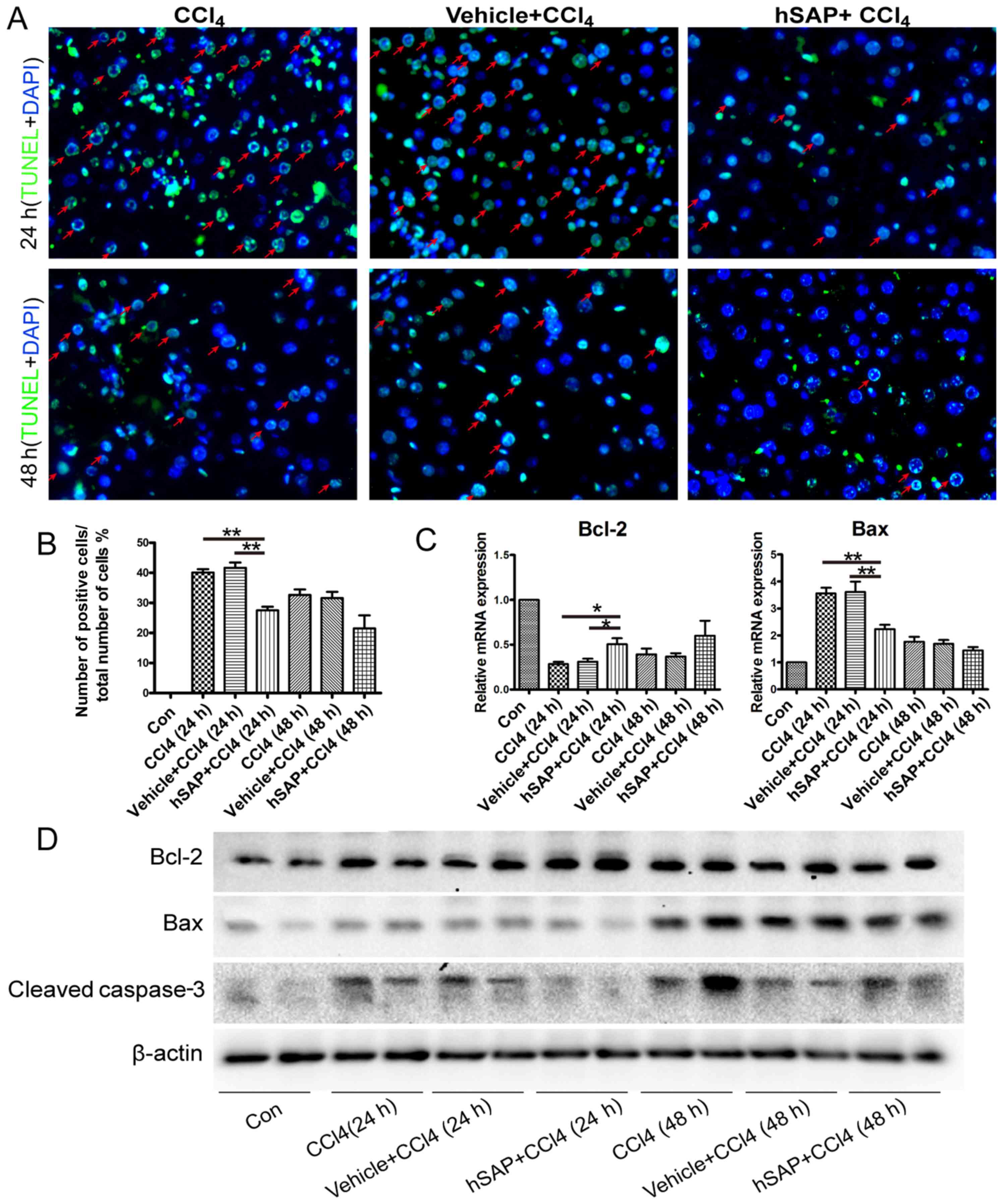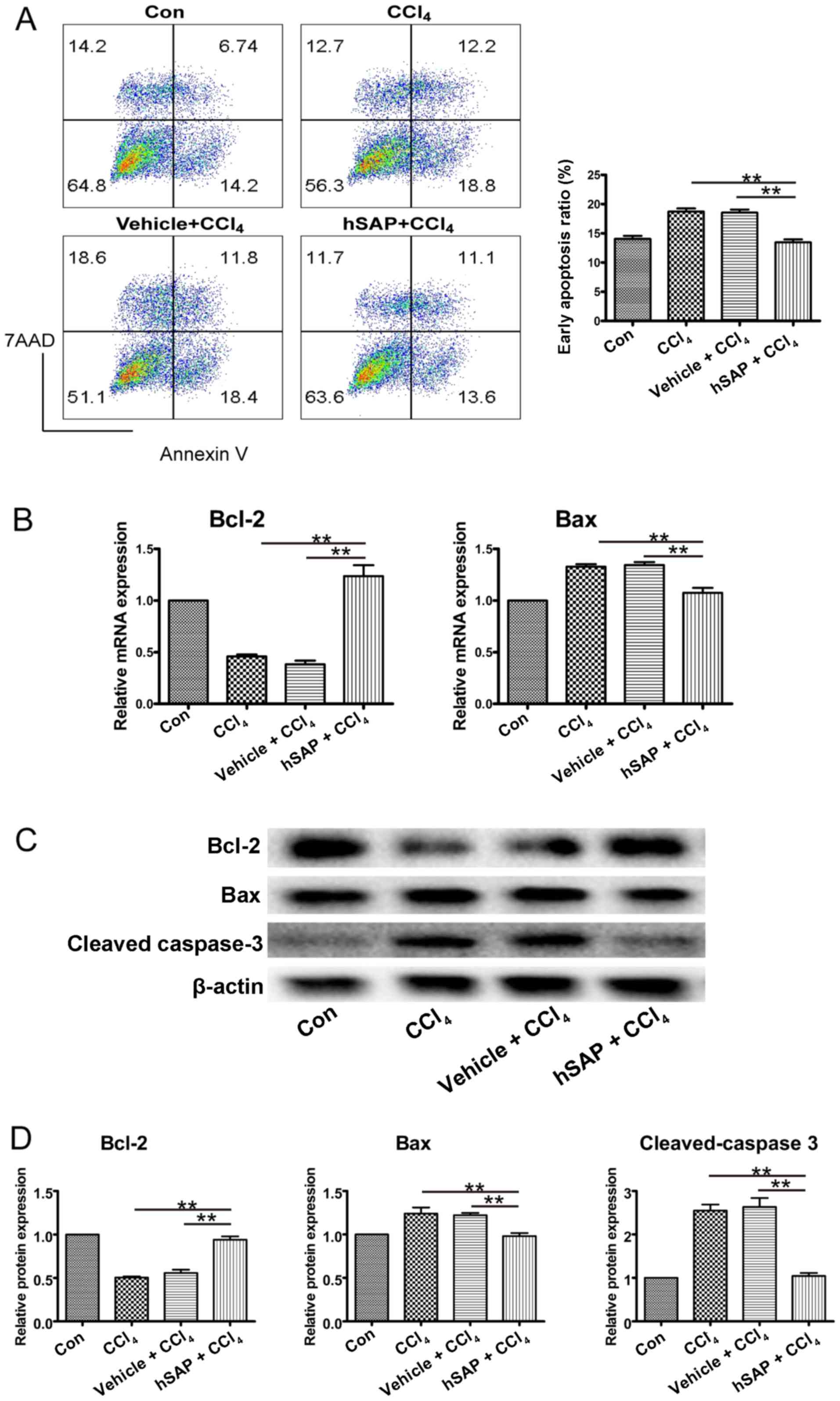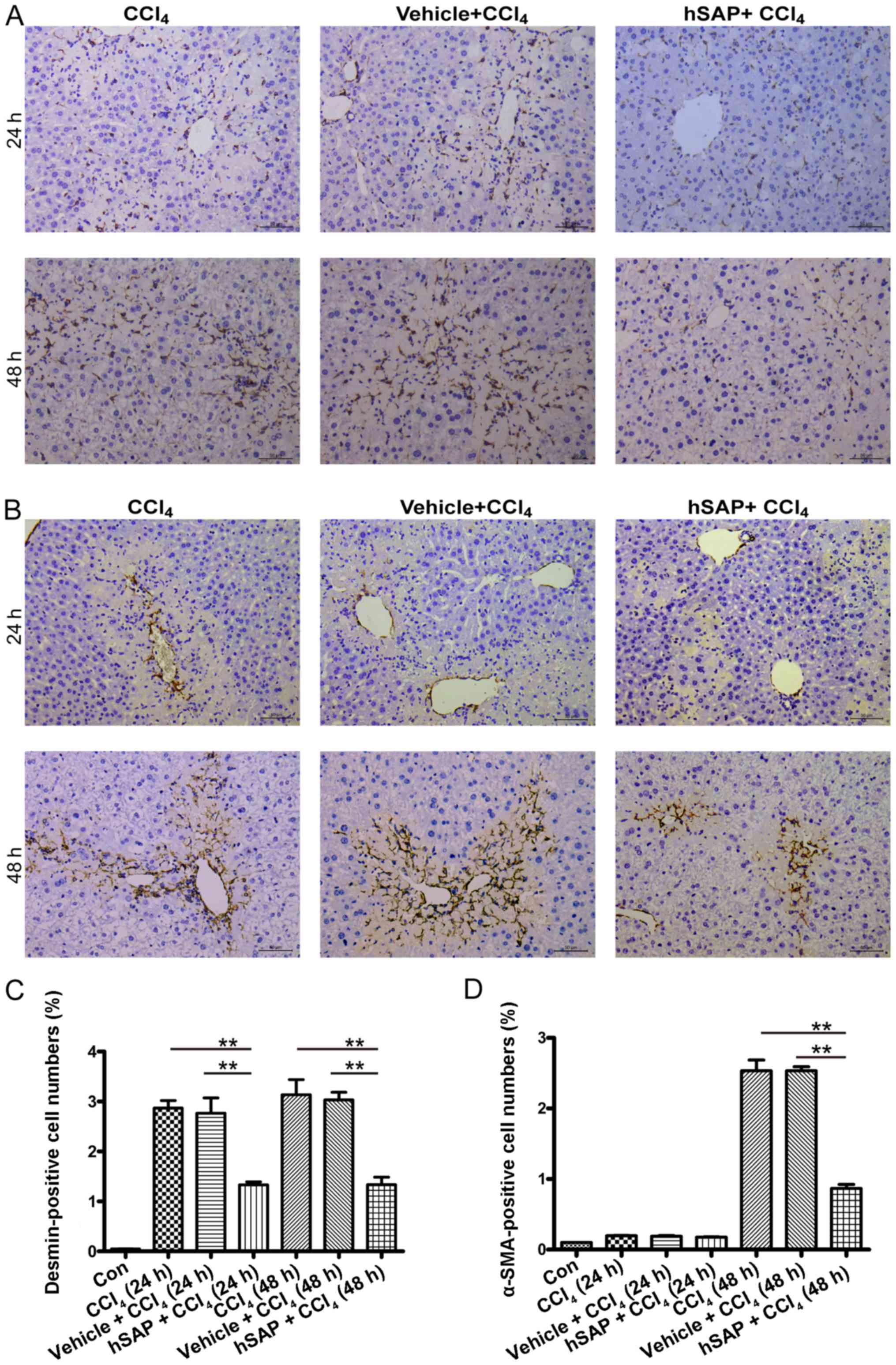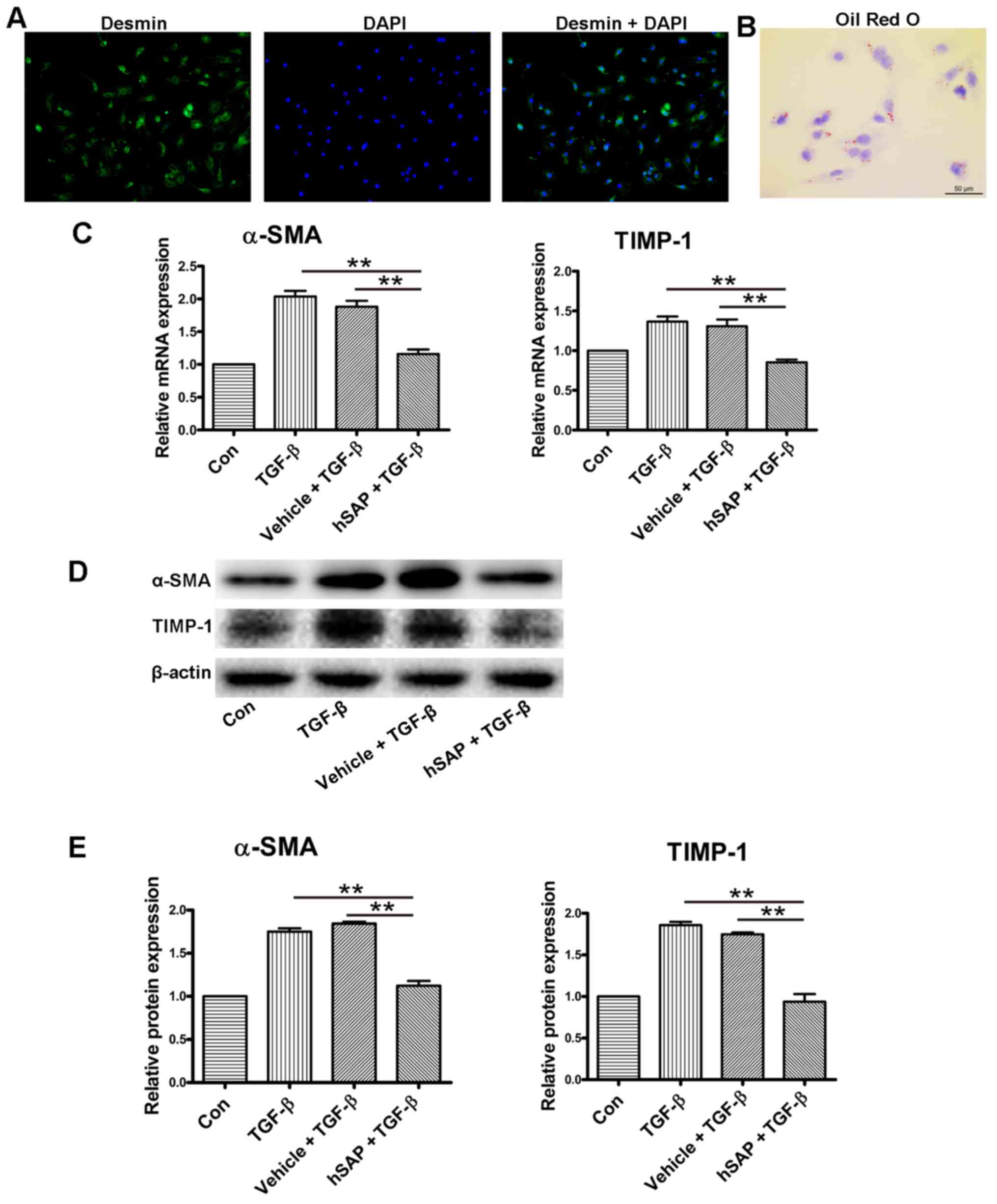|
1
|
Reuber MD and Glover EL: Cirrhosis and
carcinoma of the liver in male rats given subcutaneous carbon
tetrachloride. J Natl Cancer Inst. 44:419–427. 1970.PubMed/NCBI
|
|
2
|
Lee UE and Friedman SL: Mechanisms of
hepatic fibrogenesis. Best Pract Res Clin Gastroenterol.
25:195–206. 2011. View Article : Google Scholar : PubMed/NCBI
|
|
3
|
Schwabe RF, Bataller R and Brenner DA:
Human hepatic stellate cells express CCR5 and RANTES to induce
proliferation and migration. Am J Physiol Gastrointest Liver
Physiol. 285:G949–G958. 2003. View Article : Google Scholar : PubMed/NCBI
|
|
4
|
Hellerbrand SC, Wang SC, Tsukamoto H,
Brenner DA and Rippe RA: Expression of intracellular adhesion
molecule 1 by activated hepatic stellate cells. Hepatology.
24:670–676. 1996. View Article : Google Scholar : PubMed/NCBI
|
|
5
|
Winau F, Hegasy G, Weiskirchen R, Weber S,
Cassan C, Sieling PA, Modlin RL, Liblau RS, Gressner AM and
Kaufmann SH: Ito cells are liver-resident antigen-presenting cells
for activating T cell responses. Immunity. 26:117–129. 2007.
View Article : Google Scholar : PubMed/NCBI
|
|
6
|
Czaja AJ: Hepatic inflammation and
progressive liver fibrosis in chronic liver disease. World J
Gastroenterol. 20:2515–2532. 2014. View Article : Google Scholar : PubMed/NCBI
|
|
7
|
Mallet V, Gilgenkrantz H, Serpaggi J,
Verkarre V, Vallet-Pichard A, Fontaine H and Pol S: Brief
communication: The relationship of regression of cirrhosis to
outcome in chronic hepatitis C. Ann Intern Med. 149:399–403. 2008.
View Article : Google Scholar : PubMed/NCBI
|
|
8
|
Kweon YO, Goodman ZD, Dienstag JL, Schiff
ER, Brown NA, Burchardt E, Schoonhoven R, Brenner DA and Fried MW:
Decreasing fibrogenesis: An immunohistochemical study of paired
liver biopsies following lamivudine therapy for chronic hepatitis
B. J Hepatol. 35:749–755. 2001. View Article : Google Scholar : PubMed/NCBI
|
|
9
|
Lau DT, Kleiner DE, Park Y, Di Bisceglie
AM and Hoofnagle JH: Resolution of chronic delta hepatitis after 12
years of interferon alfa therapy. Gastroenterology. 117:1229–1233.
1999. View Article : Google Scholar : PubMed/NCBI
|
|
10
|
Czaja AJ and Carpenter HA: Decreased
fibrosis during corticosteroid therapy of autoimmune hepatitis. J
Hepatol. 40:646–652. 2004. View Article : Google Scholar : PubMed/NCBI
|
|
11
|
Mohamadnejad M, Malekzadeh R,
Nasseri-Moghaddam S, Hagh-Azali S, Rakhshani N, Tavangar SM,
Sedaghat M and Alimohamadi SM: Impact of immunosuppressive
treatment on liver fibrosis in autoimmune hepatitis. Dig Dis Sci.
50:547–551. 2005. View Article : Google Scholar : PubMed/NCBI
|
|
12
|
Lok AS, Everhart JE, Wright EC, Di
Bisceglie AM, Kim HY, Sterling RK, Everson GT, Lindsay KL, Lee WM,
Bonkovsky HL, et al HALT-C Trial Group: Maintenance peginterferon
therapy and other factors associated with hepatocellular carcinoma
in patients with advanced hepatitis C. Gastroenterology.
140:840–849. 2011. View Article : Google Scholar :
|
|
13
|
Roberts SK, Therneau TM and Czaja AJ:
Prognosis of histological cirrhosis in type 1 autoimmune hepatitis.
Gastroenterology. 110:848–857. 1996. View Article : Google Scholar : PubMed/NCBI
|
|
14
|
Haudek SB, Xia Y, Huebener P, Lee JM,
Carlson S, Crawford JR, Pilling D, Gomer RH, Trial J, Frangogiannis
NG, et al: Bone marrow-derived fibroblast precursors mediate
ischemic cardio-myopathy in mice. Proc Natl Acad Sci USA.
103:18284–18289. 2006. View Article : Google Scholar
|
|
15
|
Pilling D, Roife D, Wang M, Ronkainen SD,
Crawford JR, Travis EL and Gomer RH: Reduction of bleomycin-induced
pulmonary fibrosis by serum amyloid P. J Immunol. 179:4035–4044.
2007. View Article : Google Scholar : PubMed/NCBI
|
|
16
|
Phillips RJ, Burdick MD, Hong K, Lutz MA,
Murray LA, Xue YY, Belperio JA, Keane MP and Strieter RM:
Circulating fibrocytes traffic to the lungs in response to CXCL12
and mediate fibrosis. J Clin Invest. 114:438–446. 2004. View Article : Google Scholar : PubMed/NCBI
|
|
17
|
Murray LA, Chen Q, Kramer MS, Hesson DP,
Argentieri RL, Peng X, Gulati M, Homer RJ, Russell T, van Rooijen
N, et al: TGF-beta driven lung fibrosis is macrophage dependent and
blocked by Serum amyloid P. Int J Biochem Cell Biol. 43:154–162.
2011. View Article : Google Scholar
|
|
18
|
Duffield JS and Lupher ML Jr: PRM-151
(recombinant human serum amyloid P/pentraxin 2) for the treatment
of fibrosis. Drug News Perspect. 23:305–315. 2010. View Article : Google Scholar : PubMed/NCBI
|
|
19
|
Kisseleva T, Cong M, Paik Y, Scholten D,
Jiang C, Benner C, Iwaisako K, Moore-Morris T, Scott B, Tsukamoto
H, et al: Myofibroblasts revert to an inactive phenotype during
regression of liver fibrosis. Proc Natl Acad Sci USA.
109:9448–9453. 2012. View Article : Google Scholar : PubMed/NCBI
|
|
20
|
Yang L, Roh YS, Song J, Zhang B, Liu C,
Loomba R and Seki E: Transforming growth factor beta signaling in
hepatocytes participates in steatohepatitis through regulation of
cell death and lipid metabolism in mice. Hepatology. 59:483–495.
2014. View Article : Google Scholar
|
|
21
|
Iwaisako K, Haimerl M, Paik YH, Taura K,
Kodama Y, Sirlin C, Yu E, Yu RT, Downes M, Evans RM, et al:
Protection from liver fibrosis by a peroxisome
proliferator-activated receptor δ agonist. Proc Natl Acad Sci USA.
109:E1369–E1376. 2012. View Article : Google Scholar
|
|
22
|
Cong M, Liu T, Wang P, Fan X, Yang A, Bai
Y, Peng Z, Wu P, Tong X, Chen J, et al: Antifibrotic effects of a
recombinant adeno-associated virus carrying small interfering RNA
targeting TIMP-1 in rat liver fibrosis. Am J Pathol. 182:1607–1616.
2013. View Article : Google Scholar : PubMed/NCBI
|
|
23
|
Cong M, Liu T, Wang P, Xu Y, Tang S, Wang
B, Jia J, Liu Y, Hermonat PL and You H: Suppression of tissue
inhibitor of metalloproteinase-1 by recombinant adeno-associated
viruses carrying siRNAs in hepatic stellate cells. Int J Mol Med.
24:685–692. 2009.PubMed/NCBI
|
|
24
|
Gredelj-Simec N, Jelić-Puskarić B, Ostojić
A, Siftar Z, Fiala D, Kardum-Skelin I, Vrhovac R and Jaksić B:
Diagnostic and prognostic significance of CD45 cell surface antigen
expression in hematologic malignancies with main focus on acute
leukemias. Acta Med Croatica. 65(Suppl 1): 45–52. 2011.In
Croatian.
|
|
25
|
Karakus E, Karadeniz A, Simsek N, Can I,
Kara A, Yildirim S, Kalkan Y and Kisa F: Protective effect of Panax
ginseng against serum biochemical changes and apoptosis in liver of
rats treated with carbon tetrachloride (CCl4). J Hazard
Mater. 195:208–213. 2011. View Article : Google Scholar : PubMed/NCBI
|
|
26
|
Yang BY, Zhang XY, Guan SW and Hua ZC:
Protective effect of procyanidin B2 against
CCl4-induced acute liver injury in mice. Molecules.
20:12250–12265. 2015. View Article : Google Scholar : PubMed/NCBI
|
|
27
|
Ramm GA: Chemokine (C-C motif) receptors
in fibrogenesis and hepatic regeneration following acute and
chronic liver disease. Hepatology. 50:1664–1668. 2009. View Article : Google Scholar : PubMed/NCBI
|
|
28
|
Marra F, Romanelli RG, Giannini C, Failli
P, Pastacaldi S, Arrighi MC, Pinzani M, Laffi G, Montalto P and
Gentilini P: Monocyte chemotactic protein-1 as a chemoattractant
for human hepatic stellate cells. Hepatology. 29:140–148. 1999.
View Article : Google Scholar
|
|
29
|
Weber LW, Boll M and Stampfl A:
Hepatotoxicity and mechanism of action of haloalkanes: Carbon
tetrachloride as a toxicological model. Crit Rev Toxicol.
33:105–136. 2003. View Article : Google Scholar : PubMed/NCBI
|
|
30
|
Zhang F, Wang X, Qiu X, Wang J, Fang H,
Wang Z, Sun Y and Xia Z: The protective effect of Esculentoside A
on experimental acute liver injury in mice. PLoS One.
9:e1131072014. View Article : Google Scholar : PubMed/NCBI
|
|
31
|
Spicer J, Brodt P and Ferri L: Role of
inflammation in the early stages of liver metastasis. Liver
Metastasis: Biology and Clinical Management. Brodt P: Springer; pp.
155–185. 2011, View Article : Google Scholar
|
|
32
|
Kumar V, Abbas A, Fausto N and Aster J:
Cellular Responses to Stress and Toxic Insults: Adaptation, Injury
and Death. Robbins and Cotran Pathologic Basis of Disease. 8th
edition. Saunders Elsevier; Philidelphia: pp. 18–19. 2009
|
|
33
|
Canbay A, Taimr P, Torok N, Higuchi H,
Friedman S and Gores GJ: Apoptotic body engulfment by a human
stellate cell line is profibrogenic. Lab Invest. 83:655–663. 2003.
View Article : Google Scholar : PubMed/NCBI
|
|
34
|
Zhan SS, Jiang JX, Wu J, Halsted C,
Friedman SL, Zern MA and Torok NJ: Phagocytosis of apoptotic bodies
by hepatic stellate cells induces NADPH oxidase and is associated
with liver fibrosis in vivo. Hepatology. 43:435–443. 2006.
View Article : Google Scholar : PubMed/NCBI
|
|
35
|
Jiang JX, Mikami K, Venugopal S, Li Y and
Török NJ: Apoptotic body engulfment by hepatic stellate cells
promotes their survival by the JAK/STAT and Akt/NF-kappaB-dependent
pathways. J Hepatol. 51:139–148. 2009. View Article : Google Scholar : PubMed/NCBI
|
|
36
|
Watanabe A, Hashmi A, Gomes DA, Town T,
Badou A, Flavell RA and Mehal WZ: Apoptotic hepatocyte DNA inhibits
hepatic stellate cell chemotaxis via toll-like receptor 9.
Hepatology. 46:1509–1518. 2007. View Article : Google Scholar : PubMed/NCBI
|
|
37
|
Castaño AP, Lin SL, Surowy T, Nowlin BT,
Turlapati SA, Patel T, Singh A, Li S, Lupher ML Jr and Duffield JS:
Serum amyloid P inhibits fibrosis through Fc gamma R-dependent
monocyte-macrophage regulation in vivo. Sci Transl Med.
1:5ra132009. View Article : Google Scholar
|
|
38
|
Murray LA, Rosada R, Moreira AP, Joshi A,
Kramer MS, Hesson DP, Argentieri RL, Mathai S, Gulati M, Herzog EL,
et al: Serum amyloid P therapeutically attenuates murine
bleomycin-induced pulmonary fibrosis via its effects on
macrophages. PLoS One. 5:e96832010. View Article : Google Scholar : PubMed/NCBI
|
|
39
|
Murray LA, Kramer MS, Hesson DP, Watkins
BA, Fey EG, Argentieri RL, Shaheen F, Knight DA and Sonis ST: Serum
amyloid P ameliorates radiation-induced oral mucositis and
fibrosis. Fibrogenesis Tissue Repair. 3:112010. View Article : Google Scholar : PubMed/NCBI
|
|
40
|
Haudek SB, Trial J, Xia Y, Gupta D,
Pilling D and Entman ML: Fc receptor engagement mediates
differentiation of cardiac fibroblast precursor cells. Proc Natl
Acad Sci USA. 105:10179–10184. 2008. View Article : Google Scholar : PubMed/NCBI
|
|
41
|
Shen H, Zhang M, Kaita K, Minuk GY, Rempel
J and Gong Y: Expression of Fc fragment receptors of immunoglobulin
G (Fc gammaRs) in rat hepatic stellate cells. Dig Dis Sci.
50:181–187. 2005. View Article : Google Scholar : PubMed/NCBI
|
|
42
|
Blumberg RS, Koss T, Story CM, Barisani D,
Polischuk J, Lipin A, Pablo L, Green R and Simister NE: A major
histocompatibility complex class I-related Fc receptor for IgG on
rat hepatocytes. J Clin Invest. 95:2397–2402. 1995. View Article : Google Scholar : PubMed/NCBI
|















